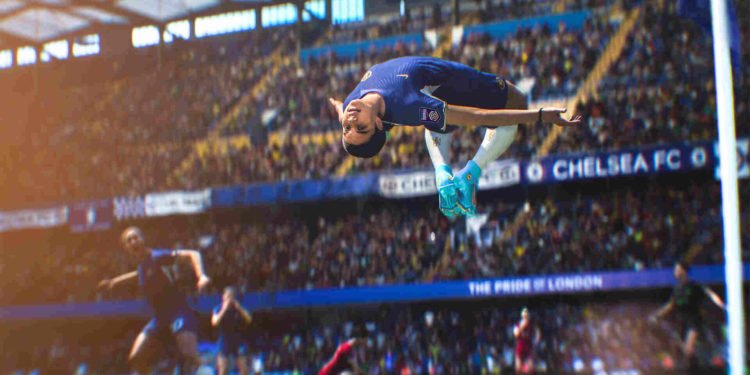While September 29, 2023, is supposed to be the official release date for EA Sports FC 24, many have already gotten their hands on the game via early access. EA FC 24 is the latest game to adopt the pay-more-to-get-early-access trend, and it seems like more titles will be adopting this strategy going forward. But one of the many issues with this strategy is that early access players have to suffer through a myriad of issues to properly enjoy a game. The same was the case with Starfield, and it’s the same here too. EA’s poor optimization has become a major source of frustration for many, and as such, players are looking for ways to get high fps and low input lag in the game. And that’s exactly what this guide will help you with.
Due to the build diversity of various PCs, having only one general recommended setting is nigh impossible for a particular game. But we have still tried to make the instructions mentioned here as effective as possible. So, go ahead and try them out and see what kind of result you get.

EA Sports FC 24 Best Settings for High FPS & Low Input Lag
Enable Game Mode
First, we will be optimizing Windows for better performance. If you haven’t activated Game mode, make sure you do so. This will allow EA Sports FC 24 to utilize all available resources, resulting in less lag and stutters. You can go to Windows Settings > Gaming and toggle on Game Mode from there.
Also, it’s generally recommended to always turn off every single option inside both the Xbox Game Bar and Capture sections. Keeping them enabled is just asking for the system to allow some resources for them when that same resource can be allocated to the game. Players will be able to find both of these settings in the same Gaming section of Windows Settings, where Game Mode is present.
Change Power Plan
For better performance, always have your power plan on either High Performance or Balanced. The former is even more preferable for power-hungry titles. To change or set up your power plan, you need to open Control Panel > Hardware and Sound > Power Options. You can now modify your power plan.
Hardware-accelerated GPU scheduling
Note: This feature is only available for Windows 10 and 11 users. Additionally, you also need an NVIDIA GTX 1000 or later/AMD 5600 series or later GPU to get access to this feature.
Keep this setting turned on, as it helps with the system’s overall performance. Furthermore, if you are someone who likes to play resource-heavy games, this particular setting will help you a lot. To enable it, just type in Graphics settings in the Windows search bar and open it. At the top, you will see the Hardware-accelerated GPU scheduling option. Toggle it on and reboot your PC.
Update GPU Drivers and Enable Image Scaling
In case you haven’t updated your GPU drivers, do so ASAP. If you want to get optimal performance from games on your PC and ensure that the GPU is in top health, make sure to update drivers constantly. You can get the latest ones from either the official Nvidia, Intel, or AMD website, depending on your GPU. Moreover, you can do the same through the official companion application too.
Don’t forget to turn on image scaling. For AMD users, it’s named Super Resolution, while Nvidia users have it as NIS (Nvidia Image Scaling). This setting can be found in the companion app (Nvidia GeForce Experience/AMD Adrenaline).
Nvidia Control Panel
Now that you have taken care of everything Windows-related, it’s time to tweak some settings via the Control Panel of your GPU. If you are using an Nvidia GPU, here are the global settings in the Nvidia Control Panel that you need to apply:
- Low Latency Mode – On
- Antialiasing – FXAA – Off
- Antialiasing – Gamma Correction – On
- Antialiasing – Transparency – Off
- CUDA – GPUs – All
- DSR – Factors – Off
- Antialiasing – Mode – Application controlled
- Background Application Max Frame Rate – Off
- Monitor Technology – Fixed Refresh
- OpenGL GDI compatibility – Auto
- OpenGL rendering GPU – Auto-select
- Power Management Mode – Normal
- Preferred Refresh rate – Application controller
- Shader Cache Size – Driver Default
- Texture filtering – Anisotropic sample optimization – Off
- Texture filtering – Negative LOD bias – Allow
- Texture filtering – Quality – Quality
- Texture filtering – Trilinear optimization – On
- Threaded optimization – Auto
- Triple buffering – Off
- Vertical Sync – Use the 3D application setting
- Multi-Frame Sampled AA (MFAA) – Off
- Max Frame Rate – <Limit at either 60 or 120 depending upon GPU capabilities>
- ECC state– Disable
- Change Resolution – Native
- Refresh Rate – Set to Maximum. Depends upon the monitor.
Change In-game settings
Finally, it’s time to open the game itself and mess around with the settings in there. Know that you can change the following settings depending on your build. These are just some general recommendations from our side. Follow them accordingly, and see if you notice any noticeable changes.
Head to the Settings menu of EA Sports FC 24, and navigate to the Display Configuration tab. Here, apply the given settings:
- Resolution – <Set to Native>
- Display Mode – <Full Screen. If using an underpowered GPU, change to Windowed>
- Refresh Rate – <Native>
- Frame Rate – <Dependent on your GPU. 60 or 120 is the ideal.>
- Vertical Sync – Off
- Dynamic Resolution Scale – Off
- Cutscene Quality – Half frame rate
- Strand Based Hair – Off
- Rendering Quality – Medium
- Grass Quality – Medium
- Crowd Quality – Low
You can also overclock your GPU, and that will give you a nice performance boost. However, do note that doing so will consume more power and increase heat. To overclock your GPU, you can use software like MSI Afterburner (GPU), AMD Ryzen Master (CPU), and such applications.
If you’ve followed the instructions stated here, we are sure that there will be at least some increase in the performance of the game compared to before. Aside from that, if you’ve got gamepad or controller-related issues in EA Sports FC 24, read this guide. And keep following DigiStatement for more guides like this. Also, read: EA Sports FC 24 Unable to Redeem Ultimate Edition FC Points (4600): Is there any fix yet

